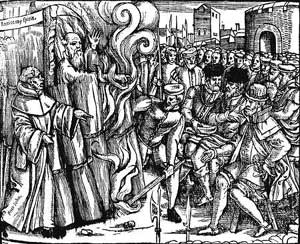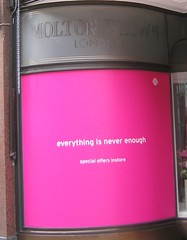.jpg)
The expenses scandal has operated as a metaphor for many commentators on the state of our society, precarious state I might say. The hapless politicians, who were only really playing the game, have become the repositories of repressed desires from all sections of society, who relieve their own stresses and strains by these projections. Moat-owners manques and those envious of the owners of two homes have relished the destruction of the paragons of a former culture which is now passing into obscurity.
Because Greed is no longer good and is no longer fashionable. The Janus-headed crisis that we are living through - a crisis of capitalism perhaps - has forced a subconscious realisation that the long-held and much supported ideology of acquisition and accumulation was destructive for us all and, most importantly, for our beautiful planetary home. From this perspective, a home that has some minor semblance of Balmoral is no longer an obscure object of desire: it has moved through being a source of mockery to seeming 'So last paradigm, darling'.
This can only bring relief to a green economist. As we need an end to economic growth, so we inevitably need an end to the culture of frenzied accumulation that has dominated our popular culture for the last 30 years or so. Before the advent of Thatcherism there was a memory (affectionate in some quarters) of the frugality of the war years and a balancing reaction from the post-materialist hippy generation of according a value to simplicity. Marshall Sahlins's Stone Age Economics , with its tales of the satisfaction of pre-capitalist indigenous societies, is a leading example of academic work in this vein.
People with less sophisticated cultures than our own know when they have had enough. Once they reach that point they stop working, sit about, natter, and generally enjoy themselves. Remember what that felt like? Changing our culture to one of sustainability will mean restoring the concept of 'enough' to our economic and social lives. It will mean a focus on satisfaction and sufficiency rather than greed and growth. This was the consumption ethic that characterised societies of the past, and still characterises peasant societies today.
Gary Snyder describes this as a subsistence economy. He makes clear how such an economy, being well-grounded in all senses, is also respectful of other forms of life and of our dependence on it for our survival:
‘A subsistence economy is a sacramental economy because it has faced up to one of the critical problems of life and death: the taking of life for food. Contemporary people do not need to hunt, many cannot even afford meat, and in the developed world the variety of foods available to us makes the avoidance of meat an easy choice. Forests in the tropics are cut to make pasture to raise beef for the American market. Our distance from the source of our food enables us to be superficially more comfortable, and distinctly more ignorant.’
The disarray amongst MPs is only a reflection of our own individual struggles with the daily temptations to over-consume and to over-compensate for our spiritual want with material excess. Tweet



